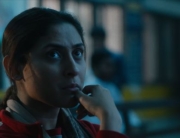The Amazing Catfish is the semi-autobiographical debut feature of Mexican director Claudia Sainte-Luce. In her early thirties, she reveals a rare talent for portraying realistic women and their complex, alternately loving and brutally critical relationships.
A lonely young woman, Claudia, about whom little is ever learned, is befriended by Martha, an older, charismatic woman dying of AIDS. The opening scenes carry the tone of a present-day dystopian thriller, following the friendless and familyless Claudia through a regular day of breakfasting in her bare apartment (with an ice cooler serving as a fridge) and working a mundane supermarket job manning a sausage sample stand. She falls ill and is forced to remain overnight at a hospital after being treated for appendicitis. She rests next to the bed of a woman surrounded by her four children.
The film begins to settle into a more ordinary story during Claudia’s sudden integration into Martha’s domestic life, which is dominated by her demanding family: a sweet, adolescent boy; a fast-budding, pretty teenage girl; a caustic, self-destructive overweight older teen; and the responsible, eldest sister struggling to balance work, family, and a (never-seen) boyfriend. After Martha offers Claudia a lift and then a homecooked meal, she becomes a fixture in the household. One by one, Claudia helps the siblings cope with their mother’s imminent death as well as other personal dilemmas.
Martha and her loud, bustling children are as much of a savior to Claudia as she is to them. The intimate chaos of their home rescues her from the isolated, repetitive life that had been steadily taking the film in the direction of a dour rather than a light drama, which is where the film quickly goes.
Yet the story is not as straightforward as that of a friendly family welcoming a stranger with open arms. Unlike the affable son, the three daughters initially regard Claudia with reluctant suspicion, but she slowly wins them over with her willingness to help their mother and assume domestic responsibilities. Claudia’s muted, timid presence also provides them the freedom of to open up with ease, a departure from their casual, often cutting, bluntness.
In its more powerful moments, the low-key drama offers insight into the simultaneously draining and enriching codependent bond between mothers and children. The four kids display a childish unwillingness to give up the coddling protection of their mother, despite her illness and clear growing inability to care for them. Martha holds on tightly to the idea of them as her needy little ones. Though exhausted and weak, she relishes pampering them with love and a sense of safety.
The viewer does not necessarily always enjoy the family’s company—with the exception of the magnetic, charming Martha, as played by Lisa Owen—yet they earn our sympathy. As for Claudia, her depiction offers a particularly unique exploration of a fledgling artist finding her emotional footing before setting out into the world.
Absent a father, the daughters are never reduced to stereotypes of females in desperate need of male attention. They are each distinct, rounded characters, with believable problems and insecurities. The often hand-held camera remains close to Claudia’s perspective, following her as she grows more and more involved in their lives. Likewise, the boy and the younger daughter come into brief but humorous contact with Claudia’s life at her workplace in a sequence which can retrospectively be seen as a momentary placeholder for the richer existence promised Claudia by the emotional growth of having been accepted by this family.
Speaking to Indiewire’s Sydney Levine of the personal experience that inspired the film, Sainte-Luce said, “They saw me; when someone sees you, you become alive, you exist and that’s what they gave me, existence.” At its core, the film is a portrait of a woman who is suddenly given a reason to live—at the same time that another woman is tragically, but gracefully, losing her life.







Leave A Comment